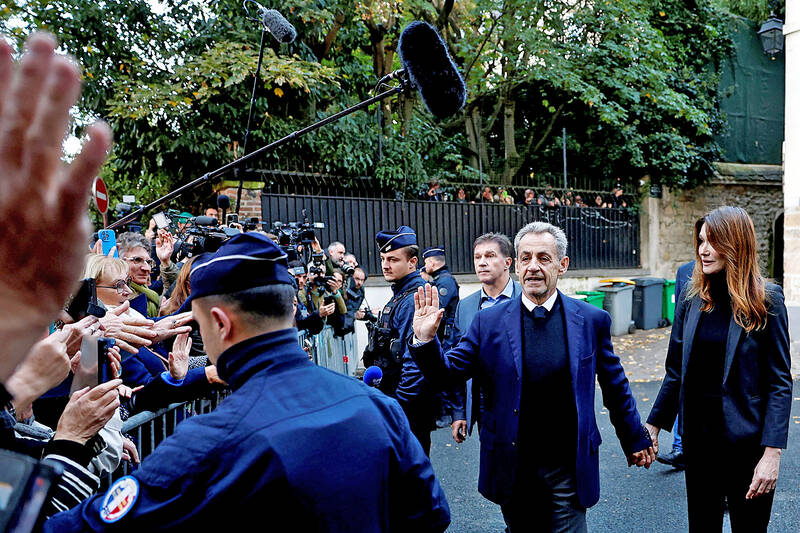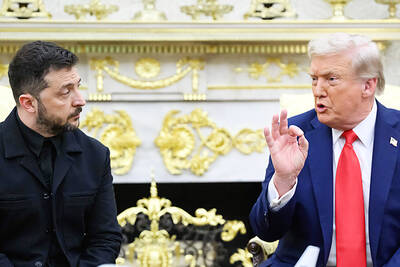Former French president Nicolas Sarkozy yesterday became the first former head of an EU state to be jailed, proclaiming his innocence as he entered a Paris prison.
France’s right-wing leader from 2007 to 2012 was last month found guilty of seeking to acquire funding from former Libyan leader Muammar Qaddafi for the campaign that saw him elected.
Sarkozy, 70, left his home and after a short drive flanked by police on motorbikes, entered La Sante prison in the French capital.

Photo: Reuters
“Welcome Sarkozy,” “Sarkozy’s here,” convicts were heard shouting from their cells.
In a defiant message posted on social media as he was being transferred, Sarkozy denied any wrongdoing.
“It is not a former president of the republic being jailed this morning, but an innocent man,” he wrote on X.
“I have no doubt. The truth will prevail,” he added.
Sarkozy was on Sept. 25 handed a five-year jail term for criminal conspiracy over a plan for Qaddafi to fund his electoral campaign.
After the verdict, Sarkozy had said he would “sleep in prison — but with my head held high.”
Dozens of supporters and family members had stood outside the former president’s home from early yesterday, some holding up framed portraits of him.
“Nicolas, Nicolas! Free Nicolas,” they shouted as he left his home, holding hands with his wife, singer Carla Bruni.
Earlier they had sung the French national anthem, as neighbors looked on from their balconies.
“This is truly a sad day for France and for democracy,” said Flora Amanou, 41.
Sarkozy’s lawyer, Christophe Ingrain, said a request had been immediately filed for Sarkozy’s release.
The Paris appeals court in theory has two months to decide whether to free him pending an appeals trial, but the delay is usually shorter.
Sarkozy is the first French leader to be incarcerated since Philippe Petain, the Nazi collaborationist head of state who was jailed after World War II.
He told Le Figaro newspaper he would be taking with him a biography of Jesus and a copy of The Count of Monte Cristo.
Sarkozy is likely to be held in a 9m2 cell in the prison’s solitary confinement wing to avoid contact with other prisoners, prison staff said.
In solitary confinement, inmates are allowed out of their cells for one walk a day, alone, in a small yard. Sarkozy will also be allowed visits three times a week.
Sarkozy has faced a flurry of legal woes since losing his re-election bid in 2012.
He has also been convicted in two other cases.
In one, he served a sentence for graft — over seeking to secure favors from a judge — under house arrest while wearing an electronic ankle tag, which was removed after several months in May.
In another, France’s top court is to rule next month in a case in which he is accused of illegal campaign financing in 2012.
In the so-called “Libyan case,” prosecutors said his aides, acting in Sarkozy’s name, struck a deal with Qaddafi in 2005 to illegally fund his victorious presidential election bid two years later.
Investigators believe that in return, Qaddafi was promised help to restore his international image after Tripoli was blamed for the 1988 bombing of a passenger jet over Lockerbie, Scotland, and another over Niger in 1989, killing hundreds of passengers.
The court convicted him of criminal conspiracy over the plan, but it did not conclude that Sarkozy received or used the funds for his campaign.
It acquitted him on charges of embezzling Libyan public funds, passive corruption and illicit financing of an electoral campaign.

Shamans in Peru on Monday gathered for an annual New Year’s ritual where they made predictions for the year to come, including illness for US President Donald Trump and the downfall of Venezuelan President Nicolas Maduro. “The United States should prepare itself because Donald Trump will fall seriously ill,” Juan de Dios Garcia proclaimed as he gathered with other shamans on a beach in southern Lima, dressed in traditional Andean ponchos and headdresses, and sprinkling flowers on the sand. The shamans carried large posters of world leaders, over which they crossed swords and burned incense, some of which they stomped on. In this

Near the entrance to the Panama Canal, a monument to China’s contributions to the interoceanic waterway was torn down on Saturday night by order of local authorities. The move comes as US President Donald Trump has made threats in the past few months to retake control of the canal, claiming Beijing has too much influence in its operations. In a surprising move that has been criticized by leaders in Panama and China, the mayor’s office of the locality of Arraijan ordered the demolition of the monument built in 2004 to symbolize friendship between the countries. The mayor’s office said in

‘TRUMP’S LONG GAME’: Minnesota Governor Tim Walz said that while fraud was a serious issue, the US president was politicizing it to defund programs for Minnesotans US President Donald Trump’s administration on Tuesday said it was auditing immigration cases involving US citizens of Somalian origin to detect fraud that could lead to denaturalization, or revocation of citizenship, while also announcing a freeze of childcare funds to Minnesota and demanding an audit of some daycare centers. “Under US law, if an individual procures citizenship on a fraudulent basis, that is grounds for denaturalization,” US Department of Homeland Security Assistant Secretary Tricia McLaughlin said in a statement. Denaturalization cases are rare and can take years. About 11 cases were pursued per year between 1990 and 2017, the Immigrant Legal Resource

‘RADICALLY DIFFERENT’: The Kremlin said no accord would be reached if the new deal with Kyiv’s input did not remain within the limits fixed by the US and Russia in August Ukrainian President Volodymyr Zelenskiy is to meet US President Donald Trump in Florida this weekend, but Russia on Friday accused him and his EU backers of seeking to “torpedo” a US-brokered plan to stop the fighting. Today’s meeting to discuss new peace proposals comes amidst Trump’s intensified efforts to broker an agreement on Europe’s worst conflict since World War II. The latest plan is a 20-point proposal that would freeze the war on its current front line, but open the door for Ukraine to pull back troops from the east, where demilitarized buffer zones could be created, according to details revealed by